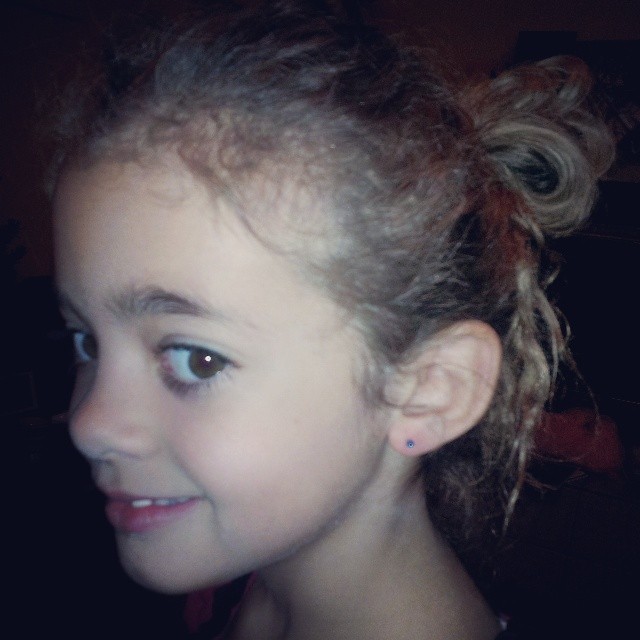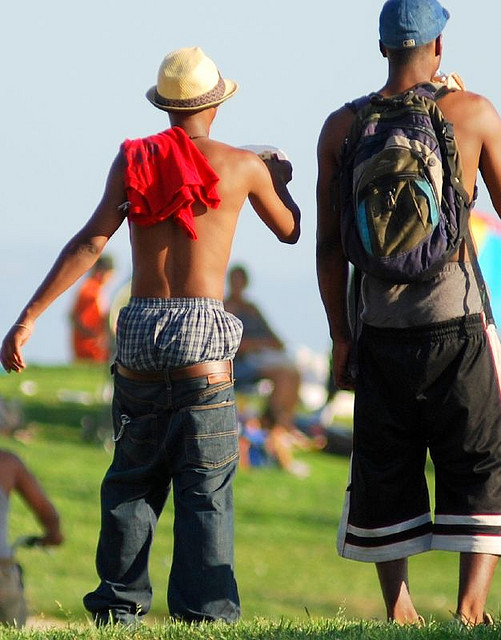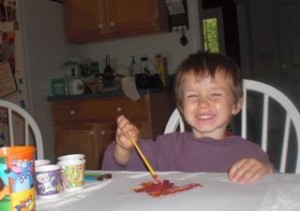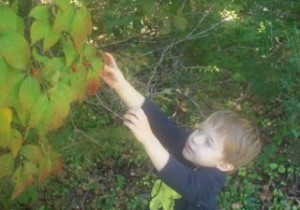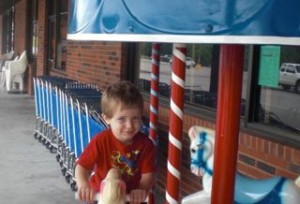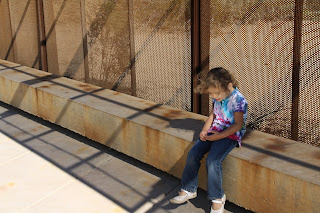A few weeks ago, Tegan (almost six at the time of this writing) got her ears pierced. She’d been toying with the idea for at least a year, but was nervous because she knew it would hurt. She talked about it all the time, and asked me lots of questions. My response was always the same. I wasn’t going to talk her into it, or talk her out of it. The only one who could make that decision for her body was her. “When you’re ready, you’ll know. And when you say, “when,” I’ll take you.”
That moment came just a few days after Christmas. Knowing that I wanted to take her to a skilled, reputable piercer who would use a needle rather than the guns used at places like the mall, I made a bunch of phone calls, and asked some friends who’d had their girls’ ears pierced. We ended up at a wonderful shop, with a kind and patient piercer who knew just how to calm Tegan’s understandable jitters. When we came in, the soundtrack to Frozen was playing, and she even had the guy at the front desk put on “Do You Want To Build a Snowman?” just as she was about to pierce, because she’d overheard Tegan say it was her favorite. How above and beyond is that?
Making it even more of an “event”, Tegan had not just her dad and I in her entourage, but also her grandparents who were visiting from Massachusetts. She’d wanted to share it with them, and they were happy to come along for the ride. It was a big, momentous day in her life, one that I was so excited to be able to give to her. We couldn’t have asked for a better experience, and Tegan is thrilled with her new earrings.
I’m thinking about it today because a friend just happened to share an article about why you should take your child to a tattoo/piercing shop (as opposed to the alternatives) to get their ears pierced. It wasn’t new information for me, but I read it with interest since ours was such a fresh experience.
When I was done, I read the comments, which were largely made by people like us… people who’d had great experiences, and were happy to share about it. And then there were a few that stood out, a few that said, (I’m paraphrasing):
I would never take my kids in to a place like that. People who work at those places look scary. I wouldn’t want my kids to have nightmares.
I grew up around such prejudices and similar attitudes about people with piercings, tattoos, etc. as well. I remember once when I was a kid, a woman visited our church with a sleeveless dress on that showed off a cute little flower tattoo on her shoulder. It was adorable (a million times tinier than any of the tattoos I would go on to get) and I was fascinated by it. But when it was mentioned later in my youth group, it wasn’t to talk about how pretty it was… it was to talk about what kind of “image” a tattoo is sending to the world…. a tattoo that we wouldn’t have even seen had she not been wearing a sleeveless dress, which, of course, sent its own message.
I decided somewhere along the way that I wanted something different for my own kids. That I didn’t want them to see people for their clothes or their hairstyles or their body modifications, but for who they are as people. I want them to assume, first and foremost, that most people are good. That most people are kind. That most people will treat them as respectfully as they’re treated in kind, no matter what their outer packaging looks like. In fact, one of the reasons I keep my dreadlocks even through those moments of “I’m cutting them all off!” desperation, is that they open so many doors for acceptance. It’s rare that we don’t have an outing that finds us talking about dreadlocks with all kinds of different people. Pierced, tattooed, modified, dreaded, shaved, dyed… all those people that moms like the one up above find “scary”… making friendly conversation and sharing kind words with strangers. Just like… well, just like the regular people that they are. Subsequently, there are few things that shock my kids appearance-wise.
That’s not to say though, that there’s anything wrong with a child being unsure or afraid of something he’s not familiar with. Not at all. Just a few months ago, we were at a museum when Tegan saw someone with some startling differences, things this woman was born with, that really scared her. I couldn’t fault her for feeling that way. How I could I? She’d never seen someone who looked like that before. What I could do was remind her, and myself, that it’s all just external. Just packaging. That beneath the exterior, we’re all the same. We’re all beautiful. Worthy of kindness, respect, and love.
So my response to those who wouldn’t want to expose their kids to those “scary” people would be this:
First, some of the nicest people I have ever met have been at tattoo shops. Truly. I’ve only had wonderful experiences at every single one of the shops I’ve gone to. My theory is that the artists who are tattooing and piercing are following a passion … people who follow their passions are happy … and happy people are nice people. Let down your guard, and let yourself see it.
And second, kids take their cues from their parents more than from anyone else. If we continue to avoid people who are “different”, they will continue to believe that “different” is scary. If we stay far away from the guy with the long dreadlocks, scoff at the guy with the coaster-sized gauged ears, and silently judge the girl with tattoos all over her neck, our kids will learn from our example. It starts with us.
It’s okay for kids to be scared or unsure when they’re first faced with someone who looks “out of the ordinary.” It’s not okay for us, as parents, to perpetuate it.


